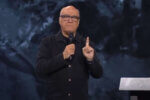A quick Internet search for the term “post-truth” in news outlets this past week yields hundreds of thousands of responses, showing its growing pervasiveness since first being named Oxford Dictionary’s International Word of the Year in 2016. The proliferation of half-truths, misinformation or complete falsehoods has only increased with the advent of COVID-19 confusion. Over two decades into the “Internet Age,” we are witnessing an ever-increasing circulation of information lacking in accuracy and, more often than not, sound judgment.
I’m sure you’ve heard of some of the conspiracy theories floating around: that 9/11 was orchestrated by a shadowy cabal of powerful Jews; that England’s Royal Family are shape-shifting reptiles from another planet; or that we’ve all been duped into believing the earth is round when it is, in fact, flat. The renewed popularity of these outrageous claims, among many others, is a prime example of our society being in the midst of a “post-truth” culture.
Today, we have access to more information than we’ve ever had before, which, ironically, makes it increasingly more challenging to decipher what, and what not, to believe. A Barna study revealed that increasingly truth is regarded as something that is felt (44%) or relative rather than something concrete or absolute. Furthermore, it appears that 32% of people believe they can’t trust anyone for credible news and feel the need to rely on their own instincts to judge what to believe and hold as truth. The question is: Can anything serve as a foundation for truth in an age where we have learned to be skeptical of everything?
As the number of people who support the idea of truth being “relative” increases compared to those who believe in “absolute” truth, I believe that Christians hold a responsibility to communicate Truth with a capital “T”; why there’s a God but, more importantly, how that God has revealed Himself to us. From my experience, I’ve learned that people have a harder time grasping the latter of the two points.
The central claim of Christianity is that God has revealed Himself to us through His Son who came to earth, fully man and fully God, Jesus Christ. The character of God was displayed through a defining act of sacrificial love when Jesus voluntarily and sacrificially gave up His life on the cross. Christians proclaim that Christ then rose again from the dead, vindicating His divine claims and bringing a new reality of resurrection life for every person who trusts in Him.
But is this just one more subjective truth claim among a panoply of others, as skeptics often claim? Isn’t it arrogant to claim that Christianity is the only truth? And wouldn’t you have to exhaustively investigate every other religious viewpoint — Islam, Hinduism, Buddhism, etc. — before claiming that yours is correct?
I don’t think so. Think of it like this. I’ve got a set of keys and they all look pretty similar. When I get to my front door, I sometimes try a few in the lock before I find the one that opens the door. But once I’ve found the right one, I don’t go on and try all the others as well, just in case they work. I know they won’t.
It’s like that with Christianity. I believe that Jesus was who He claimed to be — the Son of God — and that He proved that claim by dying and rising again. From its inception, Christianity has been a public religion making claims that could be held up to historical scrutiny in the place it was birthed. As ancient historian, N.T. Wright puts it, “The crucifixion of Jesus of Nazareth is one of the best attested facts in ancient history.”
This is not the case for most other religions whose founding documents and doctrines are based on reports of dreams, visions or personal events. In contrast, there is surprisingly strong historical evidence for Jesus’ life and death (and yes, even resurrection) — a set of events that have undeniably changed the world ever since.
If that’s true, then you’ve found the right key — the one that unlocks the door. You don’t need to search through endless other religions to see if another God is the true one. You’ve got the true key that opens the door right now.
Another Barna study discovered that 46% of teenagers, on par with Millennials, claim to need factual evidence to support their beliefs. In a world of half-truths and fake news, I welcome that statistic though I wish it was higher. When it comes to its historical bedrock, Christianity stands on firm foundations. The challenge for the church today is to communicate the evidence for Christianity to teenagers who are still attempting to figure out what to believe, all the while battling the deafening misinformation around them.
St. Augustine wrote, “The truth is like a lion; you don’t have to defend it. Let it loose; it will defend itself.” Nearly 1,700 years later, it remains true. In the end, truth isn’t just a set of facts to be discovered and picked apart. Truth is a person. His name is Jesus. {eoa}
Justin Brierley is the theology and apologetics editor forPremier Insight, which produces podcasts such as Unbelievable? and The Big Conversation in which he hosts discussions between people of opposing views on issues of belief, life, science and meaning. He is the author of “Unbelievable? Why, After Ten Years of Talking With Atheists, I’m still a Christian,” from which this article is adapted.






Leave a Comment
You must be logged in to post a comment.